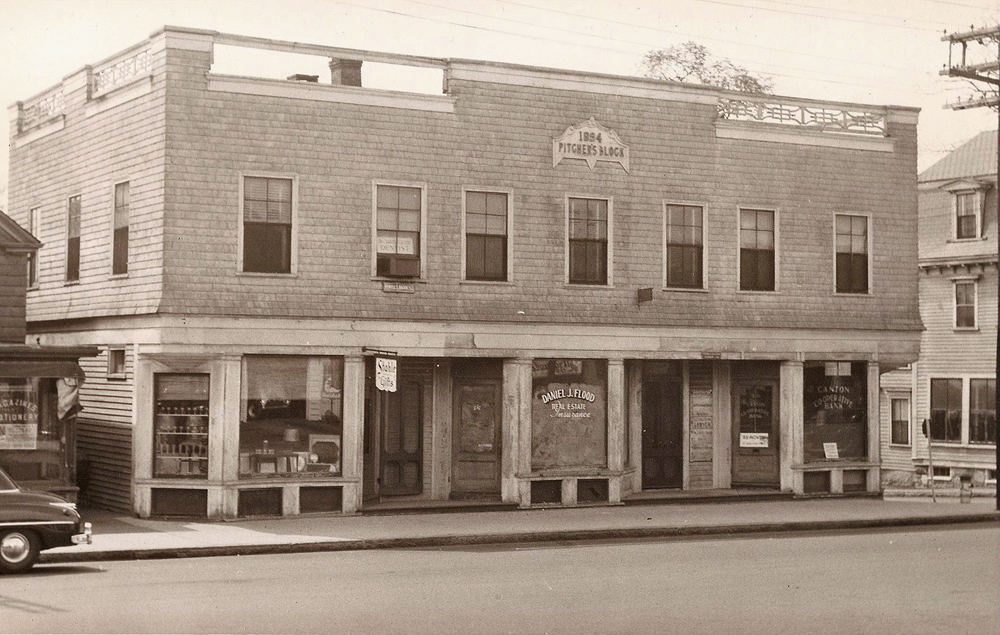True Tales from Canton’s Past: 125 Years of Promise
By George T. Comeau
The early home of the Canton Co-operative Bank in Pitcher’s Block at the corner of Washington and Rockland streets (Courtesy of the Canton Historical Society)
The following is an excerpt from “125 Years of Promise,” the latest installment of True Tales from Canton’s Past by local historian George T. Comeau.
Several years ago, this writer found himself heading for neurosurgery to correct a failed disc high up in the spine. As anyone who has been through major surgery knows, your life and finances change dramatically. The day-to-day bills stack up, and the medical cost can forever alter the pocketbook. And such was the case when my wife and I had to call upon the local bank that held our mortgage.
The discussion is uncomfortable, even more than a dozen years later. The ability to pay a mortgage and provide a roof over your head is something that can be challenged by major life events. That said, the discussion that day, so many years ago, was in the offices of the Canton Co-operative Bank. I will always remember the words of the loan officer. “George, we know that as soon as you get back on your feet you will find a way to become current with your loan.” And he was right. With that gentle reassurance everything was set straight, and it was right then and there that we vowed to maintain our longstanding relationship with our local bank.
In the age of better deals just a mouse click away, we sometimes forget that the most powerful transactions are those rooted in friendship, community, and working with local merchants. And this is indeed the case with the Canton Co-operative Bank. Now celebrating its 125th anniversary, the Co-op, as it is affectionately known, has been a major part of the growth and support of families in this town since it was founded in 1891.
The idea behind co-operative banks began in the late 1870s as a way for a local group of men intent on helping others within their community become homeowners. This kind of bank was designed unlike the banks for the wealthy. Instead, it was created by members working together to help immigrants and first-generation Americans realize the dream of home ownership.
Canton in the 1890s was made up of immigrants, many of whom were working for low wages in the factories of the booming industrial town. Housing costs were high, and as a result most newcomers — largely the Irish — would rent apartments in row houses or tenements. Yes, as it is today, it was then — there was a whole community of haves and have-nots. The path for many at the time was a loan and shares in the local co-op.
And so, on January 10, 1891, the commonwealth of Massachusetts allowed the incorporation of the Canton Co-operative Bank, and the founders began business on February 10 of that same year. They were men of some means, and all business owners themselves. Ephraim W. Thorndike was the publisher and editor of the Canton Journal; Joseph W. Wattles Jr. was a local manufacturer; and James E. Grimes a boot and shoe dealer. These three men, along with dozens of others, would begin an institution that altered the lives of thousands and the residential landscape of the town.
Leading up to the opening of the bank, Thorndike penned several articles on the front page of the Journal explaining the intricacies of banking. A full year in advance of the founding of the Canton bank, the headline on the front page read, “How Banks Do Business, things that look mysterious easily explained.” The purportedly simple explanation, it turns out, was not really all that simple. When the subject turned to co-operative banks, the headline read, “Homes, Happiness and Independence.” Making such points as being the “easiest” and “safest,” Thorndike wrote, “If you borrow at a co-operative bank and buy a house, you must go on until all is paid and the house is yours. You have been forced to save; you have been taught to save. The thought and necessity are always constantly before you. Your neighbor may spend his earnings freely, but you and your wife and children are full of the idea of paying up the monthly dues, and so you save your money and in the end you own your own house and it is free …
See this week’s Canton Citizen to read the full version of this story. Not a subscriber? Click here to order your subscription today (also available in digital form).
Short URL: https://www.thecantoncitizen.com/?p=33482










